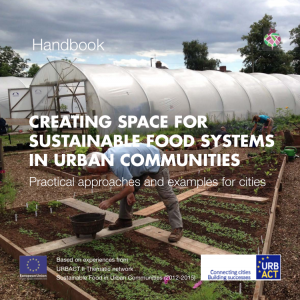The handbook
 “The 10 cities that participated in the URBACT project [Sustainable Food in urban Communities] have collectively generated a body of knowledge about sustainable food systems that will be of enormous value to their urban peers in the global north and the global south.” Kevin Morgan, January 2015
“The 10 cities that participated in the URBACT project [Sustainable Food in urban Communities] have collectively generated a body of knowledge about sustainable food systems that will be of enormous value to their urban peers in the global north and the global south.” Kevin Morgan, January 2015
The aim of this handbook is to share
the key lessons learnt during the three years of exchanges and experiences of the network; to make it available to other cities and stimulate them to start a similar journey towards a more sustainable and localised food system. It is our hope that we can inspire other cities to put food on their agenda and that cities across the world will make concrete changes that jointly generate positive impacts and drive sustainable food system reform.
This handbook draws on some of the 130 examples of promising local practices as well as on the policy evidence shared by the ten cities participating in the URBACT Thematic Network “Sustainable Food in Urban Communities” (5/2012-4/2015).
At the initiative of Brussels (Belgium), the nine cities of Amersfoort (Netherlands), Athens (Greece), Bristol (United Kingdom), Messina (Italy), Gothenburg (Sweden), Lyon (France), Ourense (Spain), Vaslui (Romania), and Oslo (Norway) joined forces to develop low-carbon and resource- efficient urban food systems and to implement Local Action Plans.
Rather than a final report, we have opted for an easy-to-follow and accessible handbook written from the pragmatic
and practical perspective of people who work in cities and deal with the complex issues of urban life and the food system on a daily basis. It is based on what is possible with selected examples of hands- on robust experiences that we have found inspirational – many achieved through creativity, vision and commitment, despite limited resources.
A range of materials and different entry points are provided that cater for different interests. The focus is on nine key topics that have emerged from the exchanges between the partner cities and their joint experience. Three main categories of information are provided for three main audiences:
– Insights for city policy makers on the importance for cities to build a sustainable and more localised food system
– A series of key learning and practical tools for practitioners and actors who would like to start a similar process in their own cities
– A rich and varied set of short case studies for a wider circle of interested readers included throughout the handbook that illustrate ways in which sustainable food initiatives can change daily life in the city.
DOWNLOAD THE HANDBOOK
Handbook : Creating space for sustainable food systems in urban communities – Practical approaches and examples for cities
INDEX OF THE HANDBOOK
Purpose of this handbook
Who should read this handbook?
1. Background
– The Project and the Partners
- Finding a way to view the urban food system and sustainability
- Finding a pragmatic approach to low carbon and resource efficiency
- Finding an action-focused framework for sustainable food in cities
2. What can cities do?
– Getting started – Some tools to assess the local food situation
3. Sustainable food-related entrepreneurship
– Growing in the city
- Urban food businesses
- New shopping scenes
- Some entrepreneurship enhancing tools
4. Food literacy and resilience
– Re-engaging the population with food
- Ensuring a food education and a positive canteen experience
- Reducing food poverty among the low-income population
- Some community building tools
5. Food governance and the city agenda
– Emerging food-oriented city leadership
– Food-oriented urban development
- City food identity and labels
- Some governance- questioning tools
Conclusions
References – Useful links – Acknowledgements
AUTHORS OF THE HANDBOOK
Core text of this Handbook was written by:
François Jégou (Lead expert) Joy Carey (Thematic expert)
With contributions from:
Brussels (Lead Partner) / Joëlle van Bambeke, Stephanie Mantell, Joséphine Henrion
Amersfoort / Anne de Feijter, Cor Holtackers, Marianne Karstens
Athens / Yannis Evmolpidis, George Keranis
Bristol / Dorothy Greaves
Gothenburg / Annika Källvik, Ulla Lundgren
Lyon / Lilian Pellegrino, Caroline Brand
Messina / Daniela Catanoso
Olso / Line Tveiten
Ourense / Uxio Novoneyra Rei, Susana Bayo
Vaslui / Vasile Paval, Stefan Dudau, Ionel Popa
Thematic expert: Kevin Morgan, Cardiff University
Graphic design:
Christophe Gouache, Thibaut Métivier / Strategic Design Scenarios
Book specifications:
Size of the paper version : 20×20 cm Number of pages : 88